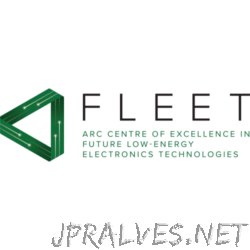Other

“A collaboration of Australian and European physicists predict that layered electronic 2D semiconductors can host a curious quantum phase of matter called the supersolid. The supersolid is a very counterintuitive phase indeed. It is made up of particles that simultaneously …
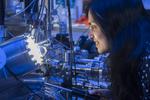
“Monash University researchers have demonstrated a new, counterintuitive way to protect atomically-thin electronics — adding vibrations, to reduce vibrations. By ‘squeezing’ a thin droplet of liquid gallium, graphene devices are painted with a protective coating of glass, gallium-oxide. This oxide is …

“A new RMIT-led study stacks two different types of 2D materials together to create a hybrid material providing enhanced properties. This hybrid material possesses valuable properties towards use in future memory and electronic devices such as TVs, computers and …
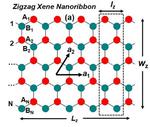
“A collaborative study led by the University of Wollongong confirms switching mechanism for a new, proposed generation of ultra-low energy ‘topological electronics’. Based on novel quantum topological materials, such devices would ‘switch’ a topological insulator from non-conducting (conventional electrical insulator …

“A RMIT-led, international collaboration published this week has observed large in-plane anisotropic magnetoresistance (AMR) in a quantum spin Hall insulator and the spin quantization axis of the edge states can be well-defined. A quantum spin Hall insulator (QSHIs) is …

“Stress enhances the properties of a promising material for future technologies. UNSW researchers find a new exotic state of one of the most promising multiferroic materials, with exciting implications for future technologies using these enhanced properties. Combining a careful balance …
“‘Growing’ electronic components directly onto a semiconductor block avoids messy, noisy oxidation scattering that slows and impedes electronic operation. A UNSW study out this month shows that the resulting high-mobility components are ideal candidates for high-frequency, ultra-small electronic devices, quantum …
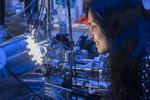
“A new Monash review throws the spotlight on recent research in heterostructures of topological insulators and magnetic materials. In such heterostructures, the interesting interplay of magnetism and topology can give rise to new phenomena such as quantum anomalous Hall insulators …

“A new study indicates holes the solution to operational speed/coherence trade-off, potential scaling up of qubits to a mini-quantum computer. Quantum computers are predicted to be much more powerful and functional than today’s ‘classical’ computers. One way to …
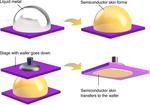
“Moore’s law is an empirical suggestion describing that the number of transistors doubles every few years in integrated circuits (ICs). However, Moore’s law has started to fail as transistors are now so small that the current silicon-based technologies …
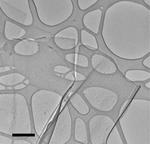
“RMIT-UNSW collaboration applies liquid-metal synthesis to piezoelectrics, advancing future flexible, wearable electronics, and biosensors drawing their power from the body’s movements. Materials such as atomically-thin tin-monosulfide (SnS) are predicted to exhibit strong piezoelectric properties, converting mechanical forces or …
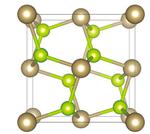
“first theoretical demonstration of both in-plane and out-of-plane spin highly energy- and direction- dependent behaviour discovered interplay between surface and bulk states plays a critical role in surface spin texture A Monash University study revealing new spin textures in pyrite …

